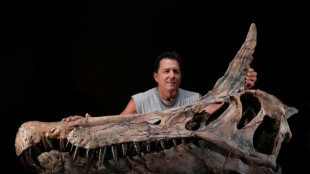
-
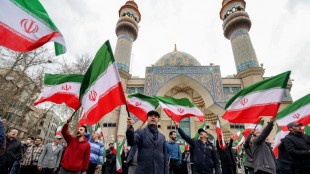 Streets empty and shops close as US strikes confirm Iranian fears
Streets empty and shops close as US strikes confirm Iranian fears
-
Israelis shelter underground as Iran fires missiles

-
 Bournemouth held by Sunderland in blow to European bid
Bournemouth held by Sunderland in blow to European bid
-
VAR expanded to include second bookings and corners for World Cup

-
 Iranians in Istanbul jittery but jubilant at US, Israeli strikes
Iranians in Istanbul jittery but jubilant at US, Israeli strikes
-
Congo-Brazzaville president vows to keep power as campaign kicks off

-
 US, Israel launch strikes on Iran, Tehran hits back across region
US, Israel launch strikes on Iran, Tehran hits back across region
-
Germany's Aicher wins women's super-G in Soldeu

-
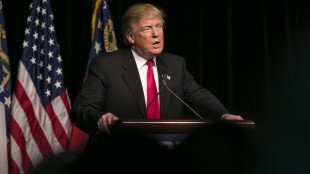 Fight against terror: Trump threatens Tehran's mullahs
Fight against terror: Trump threatens Tehran's mullahs
-
US and Israel launch strikes on Iran, explosions reported across region

-
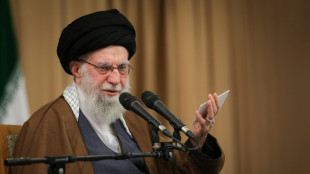 Iran's Khamenei: ruthless revolutionary at apex of Islamic republic
Iran's Khamenei: ruthless revolutionary at apex of Islamic republic
-
In Iran attack, Trump seeks what he foreswore -- regime change

-
 Climate change forces facelift for Michelangelo masterpiece
Climate change forces facelift for Michelangelo masterpiece
-
Trump says US aims to destroy Iran's military, topple government

-
 Acosta wins season-opening MotoGP sprint after Marquez penalty
Acosta wins season-opening MotoGP sprint after Marquez penalty
-
US and Israel launch strikes against Iran

-
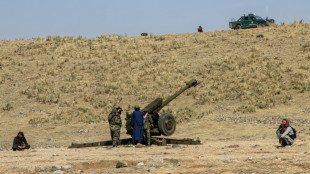 Afghanistan says Pakistan fighter jet down as cross-border strikes flare
Afghanistan says Pakistan fighter jet down as cross-border strikes flare
-
Kerr says only '85 percent' fit for Women's Asian Cup

-
 Messi's Inter Miami to visit White House: US media
Messi's Inter Miami to visit White House: US media
-
Thunder beat Nuggets in overtime on Gilgeous-Alexander's return

-
 'It's surreal': Zimbabwe superfans revel in unexpected ride to India
'It's surreal': Zimbabwe superfans revel in unexpected ride to India
-
New 'Wuthering Heights' film unleashes fresh wave of Bronte-mania

-
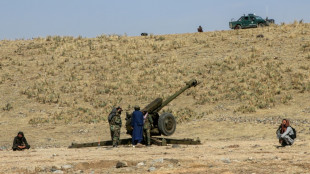 US backs Pakistan's 'right to defend itself' after strikes on Afghanistan
US backs Pakistan's 'right to defend itself' after strikes on Afghanistan
-
Bezzecchi beats Marquez to pole at season-opening Thailand MotoGP

-
 OpenAI strikes Pentagon deal with 'safeguards' as Trump dumps Anthropic
OpenAI strikes Pentagon deal with 'safeguards' as Trump dumps Anthropic
-
Oscar-nominated 'F1' sound engineers recreate roar of racetrack

-
 15 dead as cash-packed military plane crashes in Bolivia
15 dead as cash-packed military plane crashes in Bolivia
-
Costa Rica's Grynspan pledges reform in bid for UN chief job

-
 Former All Black Bridge hailed for influence at Western Force
Former All Black Bridge hailed for influence at Western Force
-
'Sinners' vampires inspired by animals, says Oscar hopeful makeup artist

-
 For Oscar nominee Stellan Skarsgard, good cinema is like slow food
For Oscar nominee Stellan Skarsgard, good cinema is like slow food
-
'Brilliant industry' sees Reds down Highlanders in Super Rugby

-
 Neil Sedaka, US singer and songwriter, dies age 86
Neil Sedaka, US singer and songwriter, dies age 86
-
Building Smarter: How Proptech Is Reshaping Canadian Real Estate Development

-
 MEWA Launches the First Saudi Water Week Next April to Shape the Future of the Water Sector Regionally and Globally
MEWA Launches the First Saudi Water Week Next April to Shape the Future of the Water Sector Regionally and Globally
-
Paramount acquires Warner Bros. in $110 bn mega-merger

-
 Rosenior eyes extended stay to stabilise Chelsea
Rosenior eyes extended stay to stabilise Chelsea
-
Spurs struggling physically admits Tudor

-
 Lens held by Strasbourg in blow to Ligue 1 title chances
Lens held by Strasbourg in blow to Ligue 1 title chances
-
NFL salary cap passes $300 mn for first time

-
 Wolves secure rare win to dent Villa's bid for Champions League place
Wolves secure rare win to dent Villa's bid for Champions League place
-
Oil prices jump on Iran attack fears while US stocks fall
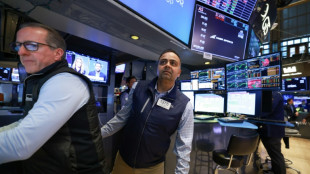
-
 Two dead, dozens injured as tram derails in Milan
Two dead, dozens injured as tram derails in Milan
-
Trump tells US govt to 'immediately' stop using Anthropic AI tech

-
 Court orders Greenpeace to pay $345 mn to US oil pipeline company
Court orders Greenpeace to pay $345 mn to US oil pipeline company
-
IAEA stresses 'urgency' to verify Iran's nuclear material
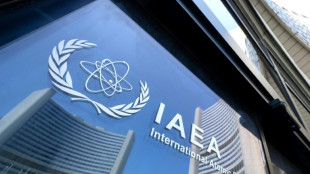
-
 UN urges action to prevent full civil war in South Sudan
UN urges action to prevent full civil war in South Sudan
-
Hackers steal medical details of 15 million in France

-
 Susan Sarandon praises Spain’s stance on Gaza
Susan Sarandon praises Spain’s stance on Gaza
-
Murray adamant size isn't everything despite losing Wales place


Nairobi startup's bid to be 'operating system for global South'
Away from the heady rush to build ultra-capable, sci-fi style artificial intelligence in Silicon Valley, ambitious Nairobi-based startup Amini AI is betting on the technology addressing emerging countries' prosaic problems in the here and now.
Chief executive Kate Kallot aims for Amini -- still a relatively small firm with $6 million in funding and 25 employees -- to become "the operating system for the Global South" in the coming years, creating the infrastructure foundation for others to build AI and data processing applications.
"There is a huge opportunity for emerging economies to focus on more applied AI innovation rather than fundamental research, which is what a lot of the US and Europe is doing," Kallot told AFP at the Vivatech trade fair in Paris.
On its website, the company highlights uses of its platform such as slashing crop insurance costs for farmers across Africa by monitoring conditions, or warning dairy producers in Morocco of water sources at risk from climate change.
Such efforts are only a hint of what will become possible as more data is collected, organised and processed from across the emerging world, Kallot believes.
"Data in Africa, Latin America, Southeast Asia, a lot of these emerging economies is still analogue and still scattered and still unstructured," she noted.
"There is a lot of work that needs to go into building that data infrastructure that can help those countries move from analogue systems to digital and help them be ready to move to AI."
Kallot said Amini's small team was helping multiple countries develop such infrastructure, highlighting a recent memorandum of understanding with Ivory Coast and projects in Barbados, India, Nepal and Cambodia.
- Digital natives short on data -
Western tech firms have notoriously turned to cheap labour from emerging economies for tasks upstream of AI, such as arduous labelling of vast datasets used to "train" AI models to recognise patterns.
But in countries like Kenya or the Philippines, "you have a population that is digitally native, extremely young... a lot of them have studied computer science" and speak English, Kallot said.
"The problem they have is that they lack the opportunity to practice their craft, because these regions are still seen as consumers of technology and are still seen as regions where innovation doesn't happen."
This is also reflected in how data is stored and processed.
A 2024 report from American research firm Xalam Analytics found that just one percent of the world's data centre capacity is located in Africa -- a region with almost 19 percent of the global population.
What's more, only two percent of African data gets processed on the continent, Kallot said.
"We're still in a very data-scarce environment, and until this is fixed we won't be able to adopt a lot of the very fancy new systems that are being put in place by... the big tech companies," she pointed out.
- Frugal and local -
Kallot sees little fallout for now in emerging economies from the US-China confrontation over the advanced chips powering the top-performing AI models.
But nations are "becoming some sort of battleground" for infrastructure investment by the superpowers' tech giants like Huawei and Microsoft.
One area where Kallot would like to see change is emerging countries coming together to build shared infrastructure like data centres, rather than relying on processing abroad or waiting for foreign firms to build them locally.
"Before, building critical infrastructure for your country meant building a road, building a hospital -- today it's actually building the data infrastructure," she said.
The choice to leave data to be processed abroad risks "erasing... a lot of your knowledge system and your culture," she warned, as most artificial intelligence training has not included information from much of the emerging world.
Looking forward, the limited infrastructure and computing power available outside top economies may actually foster frugal innovations that save energy and resources, Kallot said.
Emerging economies boast "brilliant developers that are doing things that are extremely environmentally friendly, that know how to work in a very contained and constrained environment... we just have to surface it and make sure we give them a platform," Kallot said.
S.F.Warren--AMWN

